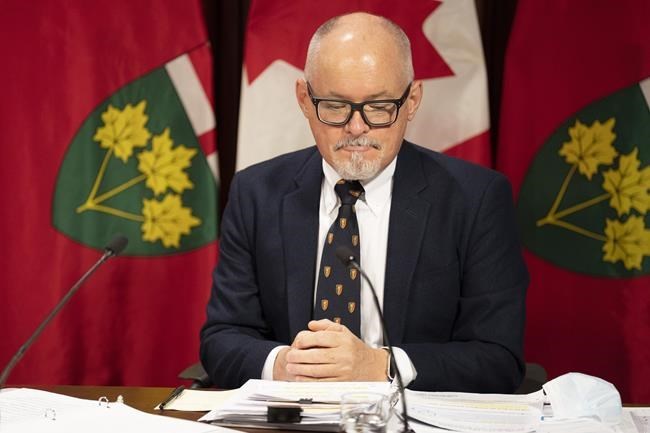TORONTO — There is a lot of COVID-19 circulating in Ontario right now, and levels of both that virus and influenza are on the rise, set to peak over the holiday season, the province's top doctor said Monday.
This is a key week for immunizing against both viruses, Chief Medical Officer of Health Dr. Kieran Moore said, as it takes 10 to 14 days for protection to take effect.
"I want to acknowledge that many people are tired of COVID, but it's not tired of us," Moore said in an interview.Â
"Certainly we're seeing lots of COVID activity across Ontario. Our metrics for last week were that we had 1,700 people in hospital, around 100 of them requiring intensive care."
That level is lower than at this time last year, but at that time COVID-19 activity was on a downswing, whereas now, it's on the rise, Moore said.
About 1.8 million Ontarians have received the updated COVID-19 vaccine this fall, but that's just 13 per cent of the eligible population and 40 per cent of people over 65.Â
"Of the hospitalizations both for influenza and COVID, the risk is really associated with age the older that you are, the better protected we need you to be from those two infections through immunizations," he said.Â
"That leaves 60 per cent of our adults over 65 not protected at present and that's got me anxious as we head into the holiday season."
The rate of people getting COVID-19 vaccinations peaked three weeks ago, he said.
Flu activity is also on the rise, Moore said.
"It's anticipated, unlike last year, that influenza is following a more traditional pattern where it will be most active over the coming holiday and New Year's season, and so it'll be most transmissible in those social settings that are coming up," he said.
Moore does not intend to enact any public health measures.
"I think we'll just continue the risk communication and the measures that people can take in terms of layers of protection, and access to medications," he said.Â
For COVID-19, there were 6,000 doses of Paxlovid dispensed last week, he said.Â
When it comes to the triple surge of COVID-19, the flu and respiratory syncytial virus that hit children hard last year and put pressure on children's hospitals, authorities have worked to ensure there won't be any shortages of children's Tylenol, Moore said.
"The system at large, I think, is prepared for this surge," he said.
"I do worry, though, as we head into influenza, that will be an extra burden on those hospitals."
There are also more than 200 people in hospital with RSV, roughly half of them children four years old and under and half people over 65.Â
Health Canada has approved an RSV vaccine for people aged 60 and older, but it is only available free of charge to people in that age group living in long-term care homes, Elder Care Lodges and retirement homes licensed to provide dementia care services.
The out-of-pocket cost for the medication can be over $250.
The government is looking at expanding public funding for the vaccine to alternative level of care patients in hospital — people who can be discharged to a long-term care home, for example, but don't yet have a spot — and/or dialysis patients, Moore said.Â
This report by The Canadian Press was first published Dec. 4, 2023.
Allison Jones, The Canadian Press




